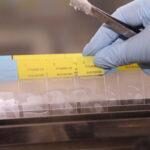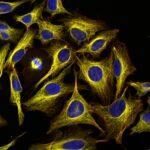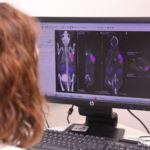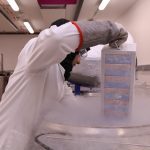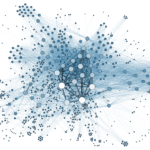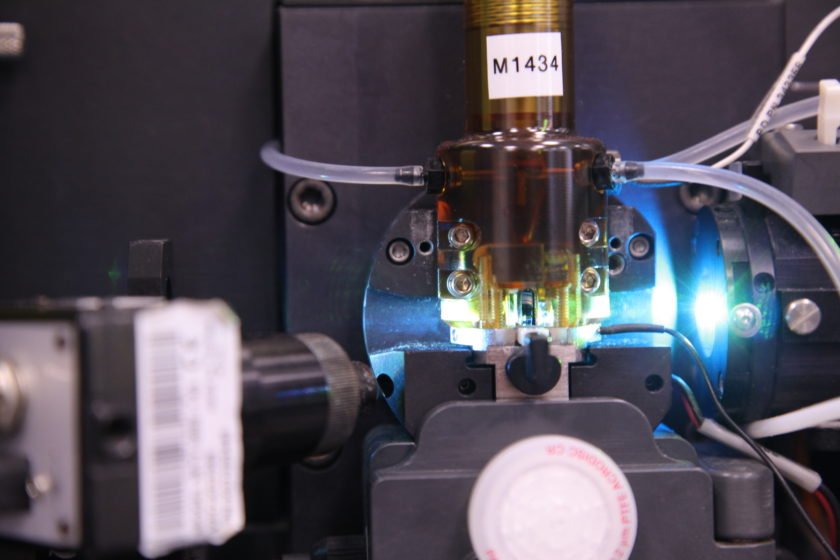
Contact
Flow Cytometry
Welcome to the BCI Flow Cytometry Facility at Charterhouse Square, London. Our facility is equipped with a wide range of conventional, spectral, imaging flow cytometry and mass cytometry instrumentation enabling high-throughput, multi-parametric single-cell analysis across a number of disciplines.
Our aim is to provide an extensive range of state-of-the-art, professional cytometry services on a fee-for-service basis. We are open to internal (Queen Mary University of London, including Barts Cancer Institute, William Harvey, The Blizard and Wolfson Institute) and external users (academia or industry) and are available for any research projects or commercial work consultations. A wide range of training courses and high dimensional data analysis platforms and services are also available in the facility for all our users.
- Meet the Team
- Location & Opening hours
- Instruments
- Using the Facility
- Services & Support
- Pricing/Charges
- Instrument information
- Training
For general enquiries:
- Email: flowcytometry@qmul.ac.uk
- Phone: +44 20 7882 2119
Manager: Dr Manuela Terranova Barberio, PhD m.terranovabarberio@qmul.ac.uk
Please contact the Facility Manager for financial requests, quotations, grant applications, new project discussion or any enquiries for external access.
Team members:
- Senior Flow Cytometry Technician: Stephen Roger
- Flow Cytometry Technician: Dr Foram Vaydia, PhD
- Flow Cytometry Technician: Atar Diwani-Massarwa
Location
We are located in Room 2.08 and 211 on the 2nd floor of John Vane Science Centre.
Address
Flow Cytometry Facility
2nd Floor, John Vane Science Centre, Charterhouse Square
Queen Mary University of London
London
EC1M 6BQ
Opening Hours
- Core Hours: Monday-Friday 9:00am-5:00pm
- Cell Sorting Service: Monday-Friday 10:00am-5:00pm
- Mass Cytometry liquid and imaging Service: Monday-Friday 10:00am-5:00pm
- Cytometers/Analysers are open 24/7 for trained internal users
- External user (trained) access: Monday-Friday 09:00am-5:00pm
Self-Use Analysers
Please note that prior to using any of our equipment, it is compulsory to complete a registration and attend training.
- BD LSR Fortessa 4L (V-B-Y/G-R) – conventional flow cytometer x2
- BD LSR Fortessa 3L (V-B-R) – conventional flow cytometer x1
- Thermo Fisher Attune NxT 3L (V-B-R) – high throughput conventional flow cytometer with plate reader (autosampler) x1
- BD FACSymphony A3 5L (UV-V-B-Y/G-R) – high-end conventional flow cytometer x1
- Cytek ImageStreamX MKII 3L (V-B-R) – imaging flow cytometer x1
- Cytek Aurora 4L (UV-V-B-R) – high-end spectral flow cytometer x1
Services & Staff-operated instruments
- BD FACS ARIA II 4L (V-B-Y/G-R) – cell sorter x 1
- BD FACSAria Fusion 4L (V-B-Y/G-R) – cell sorter x 1
- CyTOF2 Mass Cytometer – single cell suspension x1
- Helios/Hyperion Mass Cytometer – single cell suspension and imaging x1
General information & registration
- All users must register with the facility, attend training and have an induction before accessing the facility/instruments. Please review the training tab for more details on what is offered and contact the core at flowcytometry@qmul.ac.uk for further details on how to get trained and information on our next upcoming training dates.
- You will need an iLab account for scheduling instrument time, sorting, training requests, and analysis platform access requests. Link for iLab sign-up and information here: iLab sign-up
If you are a QMUL member, please register to iLab using your QMUL credential. You will need to join your PI lab on iLab and be assigned to a grant code. This is necessary and mandatory to be able to use the instruments. Please email the core at flowcytometry@qmul.ac.uk or iLab support iLab-support@agilent.com for further help.
For external users, an iLab account is preferrable, but not mandatory. Please address your enquires to m.terranovabarberio@qmul.ac.uk
- Instruments can be booked using the iLab Booking system
- Please ensure to acknowledge the BCI Flow Core Facility in any publications, poster, conference or presentations that include work carried out using staff, services or equipment in the facility. This is vital in order to demonstrate the funding we receive is being utilized as intended and to ensure continued funding for the facility, as the cost recovery model in place only partly covers total running costs. By accessing the facility, you agree and confirm with this policy.
Please see below for more details about acknowledgement.
Acknowledgement
The BCI Flow Cytometry Core Facility is funded by Cancer Research UK (CRUK).
- Please use the following phrase to acknowledge the use of the BCI Flow Cytometry Facility on any publications and presentations: "Flow Cytometry experiments were performed in the BCI Flow Cytometry Facility. The BCI Flow Cytometry Facility is supported by the CRUK Flow Cytometry Core Services Grant at Barts Cancer Institute (Core Award C16420/A18066)” and/or (for the ImageStream) “The Wellcome Trust Grant:101604/Z/13/Z”.
- You may also wish to acknowledge an individual member of staff (delete as appropriate): “In particular, we thank [name] for their advice and support in flow cytometry/cell sorting/CyTOF/ImageStream/Attune Nxt/Fortessa/Symphony A3/Cytek Aurora”.
- In addition to the acknowledgement statement, it is important to offer authorship in a publication if a member of the team has helped with the design, troubleshooting and data analysis of a project or experiment. This is particularly important for Technician Staff career progression and shows their help is properly valued. Our staff is more than happy to help, review and advise on manuscripts.
- Please send us a reprint or pdf of your accepted paper so we can keep track of these acknowledgements and post your accomplishment in the lab.
Thank you for your support and recognition!
At the BCI Flow Cytometry Core Facility we offer state-of-the-art instrumentation and expertise to take your research to the next level. Offering various services, including cell sorting, liquid and imaging mass cytometry, multi-colour analysis, instrument training, data analysis support, data analysis training and experiment and panel design assistance, we are here to help.
In particular, cell sorting and liquid and imaging mass cytometry are dedicated services provided by the facility staff. These services can be booked and arranged by emailing the general team email at flowcytometry@qmul.ac.uk
Cell sorting
Our facility is a BSL 2 facility and offers cell sorting service on two sorters with up to 16 fluorescent parameters allowing for high-speed multicolour sorting with digital acquisition camera. Both instruments allow sorting with nozzles ranging from 70 to 130 μm and operates the latest version of BD FACSDiva software for acquisition.
Both instruments are run by trained staff members and allow for sterile cell collection with two- and four-way bulk sorting in tubes or single cell (and bulk) sorting into a variety of plates, with sample and collection tube cooling/heating and Index sorting available.
Please see configuration on our iLab page here under Description next to the instrument.
- BD SORP FACS ARIA II 4L (V-B-Y/G-R) - cell sorter x 1
- BD SORP FACSAria Fusion 4L (V-B-Y/G-R) - cell sorter x 1
Mass Cytometry
We have two Standard Biotools mass cytometers: one instrument is used for single cell suspension (liquid mode), while the second can be used also for acquisition of frozen and FFPE tissue and cell samples (imaging mode).
These systems use heavy metal isotope-conjugated antibodies instead of fluorochrome-conjugated antibodies and detect them using Time of Flight Mass Spectrometry. They are capable of detecting 50+ different antigens and so are ideal for deep-immunophenotyping and clinical trial samples. The team can give assistance in metal tag conjugation and will run the samples and normalise the data for the user.
- CyTOF2 Mass Cytometer – single cell suspension x1
- Helios/Hyperion Mass Cytometer – imaging x1
Experimental planning & Troubleshooting
Expert advice is available on experimental design, troubleshooting and data post-acquisition. If you are new to flow cytometry and need support in planning a new flow or sorting experiment, optimizing the staining and your samples’ preparation or to run longitudinal clinical and not clinical studies, our team is here to help you to achieve high quality results.
We also develop and introduce new techniques and technologies that would be useful to our users. Recently we have introduced spectral flow cytometry and imaging mass cytometry to the lab, enhancing the number of parameters that can be measured. This will enhance the range of applications that we can provide.
If you are interested in acquiring new technologies that could benefit your research project and be added to the facility portfolio, we are happy to collaborate in grant application. Please email m.terranovabarberio@qmul.ac.uk to start the conversation.
Panel design & Data analysis
Support and assistance is also available for high dimensional parameters panel design, sourcing and supply of reagents, data analysis, presentation and interpretation of data.
The Facility also offers access to a data analysis workstation with multiple different data analysis platforms that can facilitate your high dimensional data analysis and data presentation. Please email flowcytometry@qmul.ac.uk for further information.
- FlowJo
- OMIQ
- Idea (Imagestream data analysis platform)
- SpectroFlo® (Aurora data analysis platform)
- Internal users can find the current fee available on our iLab page.
- For external use or if you require a quote for future use (for example for grant applications) please email m.terranovabarberio@qmul.ac.uk
Fortessa: Equipped with 3/4 LASERS: 405nm VIOLET, 488nm BLUE, 561nm YELLOW/GREEN and 640nm RED
- This analyser is capable of detecting up to 14 (3 laser system) and 16 (4 laser system) different fluorescent channels simultaneously.
- This instrument is ideal for high-throughput multi-parameter single cell analysis eg. Phenotyping, immumo-phenotyping etc.
Symphony A3: Equipped with 5 LASERS: 355nm Ultra Violet, 405nm Violet, 488nm Blue laser, 561nm Yellow-Green and 637nm Red
- This analyser is capable of detecting up to 28 different fluorescent channels simultaneously.
- This instrument is ideal for high-throughput multi-parameter single cell analysis eg. Phenotyping, immumo-phenotyping etc.
Attune NxT: Equipped with 3 LASERS:405nm VIOLET, 488nm BLUE and 637nm RED
- This analyser is capable of detecting up to 11 different fluorescent channels simultaneously (or 10 when using violet side scatter for whole blood analysis).
- This instrument is ideal for high-throughput multi-parameter single cell analysis eg. Phenotyping, immumo-phenotyping etc.
- This is a very high-throughput system due to acoustic focusing (5-10X faster than other analysers)
- Automated Plate Acquisition (flat/V/U 96* 384 well plate)
- Whole Blood Analysis Capability (using the violet side-scatter, VL1)
- Besides the standard Facs tube, Attune can also accomodate 1.5ml and 2ml eppendorf
- Unused samples can be recovered (i.e unused samples will be returned to the facs tube)
ImageStream: Equipped with 2 CCD cameras and 3 LASERS:405nm VIOLET Laser, 488nm BLUE Laser and 633nm RED
- Imaging Cytometry (ImageStream) combines high throughput flow cytometry with imaging. This analyser is capable of detecting up to 10 different fluorescent channels simultaneously (or 9 when using side-scatter) + 2 brightfield. The cytometer allows direct imaging of the cellular components of the sample with 20x, 40x and 60x magnification.
- High-throughput multi-parameter single cell analysis eg. Phenotyping and immumo-phenotyping
- ImageStream combines flow cytometry with fluorescence microscopy and is ideal for particularly functional studies eg. translocation, internalization, co-localization, cell shape changes, spot counting, immunological synapse and much more.
CytekAurora: Equipped with 4 LASERS: 355nm ULTRAVIOLET,405nm VIOLET, 488nm BLUE and 635nm RED
- This analyser is capable of detecting up to minimum 30 fluorescent channels simultaneously and with careful panel design potentially can be pushed up to 35 fluorescent channels.
- This 4-laser system will measure the FULL fluorescence signal (not just maximum emission) of each given fluorochrome where each fluorochrome will have a unique signature. Given that the instrument measures unique signatures (spectral signal) this instrument is capable of separating close/similar fluorochromes (eg. GFP vs AF488, APC vs. AF647) which currently is not possible with any of the other instruments available.
- In addition, the instrument will also consider autofluorescence and reduces the impact of autofluorescence, thus giving a powerful tool for high parameter experiment/analysis.
- High-throughput multi-parameter single cell analysis eg. Phenotyping and immumo-phenotyping
- In addition to normal Facs tube, this instrument can accommodate 96 well plate for high throughput and autonomous work
Cell sorters (Fusion & Aria): Equipped with 4 LASERS:405nm VIOLET, 488nm BLUE, 561nm YELLOW/GREEN and 640nm RED
- This analyser is capable of detecting up to 14-18 different fluorescent channels simultaneously.
- The instrument allows the aseptic separation of different cell types. It is equipped to sort up to four different cell populations (targets) simultaneously.
- High-throughput multi-parameter single cell analysis and sorting. Multi-parameter fluorescent activated cell sorting to isolate and recover your cells of interest for various post sorting application (eg. Cell culture, sequencing, transplantation etc).
- The cells of interest can be sorted (collection) into 1.5ml Eppendorf, standard Facs tube, 15ml falcon tube or U/V/flat bottom plates (6, 12,24,48,96 and 384).
- Cell sorting is a dedicated service provided by the Charterhouse Flow Cytometry Facility. The service can be requested via the Flow Cytometry lab/team (flowcytometry@qmul.ac.uk). The services are provided on a first-come-first-serve basis.
Aria II: Consists of four lasers- violet (405nm), blue (488nm), yellow/green (561nm) and red (633nm)-and is capable of measuring up to 14 parameters.
Aria Fusion in a Biosafety Cabinet: Consists of four lasers- violet (405nm), blue (488nm), yellow/green (561nm) and red (633nm) and is capable of measuring up to 18 parameters. The sorter is in a biosafety cabinet allowing the processing of unscreened human material.
CyTOF & Hyperion: Multi-parameter analysis using Time of Flight Mass Cytometry.
- CyTOF 2: The Fluidigm CyTOF 2 is a Mass Cytometer for Phenotypic analysis of single cells using Time of Flight Mass Spectrometry. This technology provides next generation single cell analysis of cells in suspension with the ability to investigate over 30 cellular parameters simultaneously. This system uses heavy metal isotope-conjugated antibodies instead of fluorochrome-conjugated antibodies thus reducing spill over issue (and complex panel design) and the need for compensation. This makes it the perfect tool for gaining a large amount of information where sampling material is limited and for carrying out complex deep-phenotyping of rare cell types.
- CyTOF is a dedicated service provided by the Charterhouse Flow Cytometry Facility. The service can be requested via the Flow Cytometry lab/team (flowcytometry@qmul.ac.uk). The services are provided on a first-come-first-serve basis.
- Hyperion: Imaging Mass Cytometry harnesses the multiparametric power of mass cytometry in a slide-based format; permitting simultaneous interrogation of up to 37 markers of interest in both FFPE and frozen tissue sections. Please contact Najah Islam (najah.islam@qmul.ac.uk) for more information.
Training
We offer several different training courses no matter where your experience level is with flow. All new users must attend basic training before accessing the self-use analysers.
Please email flowcytometry@qmul.ac.uk for any enquiry.
Basic Training: mandatory training for all users. During this training, you will learn the basics of flow cytometry theory and how to run a cytometer to have more flexibility when reserving our instruments. This is a one-day training course that will include an induction to our facility labs and two hands-on practical sessions to get access to all conventional flow cytometers in the facility. No prerequisites are needed, but a free top-up training may be required to access different platforms. This training runs on a monthly basis, please email the core email to find out when the next training is scheduled.
Aurora Training: during this training, you will be introduced to the fundamentals of spectral flow cytometry theory and will learn the difference between conventional and spectral flow cytometry. You will learn how to interpret and analyse spectral signatures, how to QC and troubleshoot your signatures and reference controls to obtain optimal unmixing. You will also learn how to design and troubleshoot your experiment and the workflow for the SpectroFlow software and the Aurora instrument. Prerequisites: basic training and some knowledge of conventional flow cytometry theory. Please email the core email to find out when the next training is scheduled.
ImageStream Training: during this training, you will be introduced to the ImageStream technology and fundamentals of imaging flow cytometry. You will learn all the necessary tips for panel design, sample preparation and experiment troubleshooting, focusing on the difference with conventional flow cytometry. With a hands-on practical session and data analysis workflow, you will learn how to take advantage of this platform to combine flow cytometry with imaging features and enhance your research project. Prerequisites: basic training and some knowledge of conventional flow cytometry theory. Please email the core email to find out when the next training is scheduled.
FlowJo Training: during this training, you will learn how to analyse your data using the FlowJo analysis platform (also available in the core). No prerequisites are needed. This training is organized with hands-on practical sessions designed for both beginners (with no experience) and more advanced users (with previous experience, but who would like to deepen their knowledge and require advanced analysis requirements). You will learn how to import your data and perform standard data analysis workflow or implement optimized workflow for large data sets analysis. You will also learn to perform post-acquisition compensation, generate statistical reports and ready-for-publication figures or perform data analysis for specific applications like cell cycle and proliferation assays. By attending this course, you will also be introduced to the basic concepts and tools to perform high-dimensional data analysis on FlowJo.

